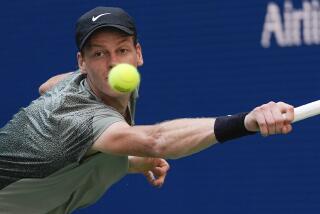Williams Ousted in Australia
- Share via
MELBOURNE, Australia — Serena Williams, the reigning United States Open women’s singles champion, left the Australian Open in a huff here today.
She exited the first Grand Slam event of the year in the round of 16, going out, 6-3, 6-3, at the hands of No. 16-seeded Elena Likhovtseva of Russia.
A short while later, she departed her post-match news conference in danger of tripping over her lower lip.
Among her parting words were, “Other players play harder against me than against other people,” she said. “That was the way even before I won the U.S. Open. . . . I have seen some players that I play come against me and they play a game better than the No. 1 men in the whole world and they go against other players and they don’t play half as well and they just like, unbelievable, they lose.”
She was asked the obvious follow-up: Why?
“You’re going to have to ask them,” she responded, in full sulk.
Other topics brought similar responses.
Why had she played no tour matches since Oct. 4, and arrived here, numerous time zones away, only three days before the tournament began? In hindsight, did she wish she had prepared differently?
“No, I wasn’t unprepared,” she said. “I was here long enough and, you know, I answered that question a million times. I lost because I didn’t play well and she played good.”
Did she miss having the company and advice here of her sister, Venus, ranked a notch above her in the world rankings at No. 3, but at home in Florida with what her father reported as tendinitis in her wrists?
“Not really,” she said. “I mean, my dad, you know, is basically my coach, not Venus. So whenever I do struggle, I usually go to my dad.”
Again, the obvious follow-up question: If your dad is your coach, did it hurt that he was not here, especially since most players bring their coaches to tournaments, especially Grand Slam events?
“I don’t understand what’s the problem,” she said. “My mom is here. She’s my coach, also. She’s been here throughout my whole career, and she’s my coach. What part of that is like a big problem for everyone to understand?”
Obvious follow-up question No. 3: But you just said your father is your coach?
“My dad and my mom, as I said a thousand times in plenty of interviews, are, is [sic] my coach. I don’t know what other way to say it to make you understand. If I said it in a different language, would that help you?”
And so it went, as so many of these sessions with Serena--and Venus--Williams tend to go. Abbott and Costello have nothing on this pair. With the Williams’ sisters, you simply cannot find out who’s on first.
To her credit, between snarled answers, she did manage to give credit to Likhovtseva, 24, who was making her best advancement in a Grand Slam tournament, her stunner over Williams putting her in the quarterfinals opposite Conchita Martinez.
Likhovtseva fell behind in the first set, 3-1, and then took control. She was a bit shaky on her first two match points, but got the third when Williams pounded a backhand into the net. She made only 20 errors, to 32 by Williams, and converted five of nine chances on break points.
Likhovtseva, a recent newlywed--the wedding was in September at Las Vegas--had another great moment here in 1996. She ousted Mary Pierce in the second round, marking the earliest departure of a defending Australian women’s champion.
But before today’s upset victory, and despite her No. 16 seeding, Likhovtseva had labored in near anonymity. In her third-round match, when she beat Els Callens of Belgium, she did so late in the afternoon, out on Court 7, where those who made it out that far onto the grounds wandered around and chatted openly and loudly during play. At one point during a crucial first-set tiebreaker that she won at 12-10, a head count showed that there were exactly 32 people in the stands, some of them even watching.
Her highest ranking has been the No. 15 she got to last fall. She is currently at No. 18, but with a victory over Martinez, she is likely to reach her highest ranking.
Afterward, Likhovtseva seemed as stunned as everybody else about what she had done.
“My husband and everybody was saying you have a chance, and you should beat her,” she said, not sounding all that convinced.
But then, it didn’t matter what she felt, only what she did.
More to Read
Go beyond the scoreboard
Get the latest on L.A.'s teams in the daily Sports Report newsletter.
You may occasionally receive promotional content from the Los Angeles Times.











